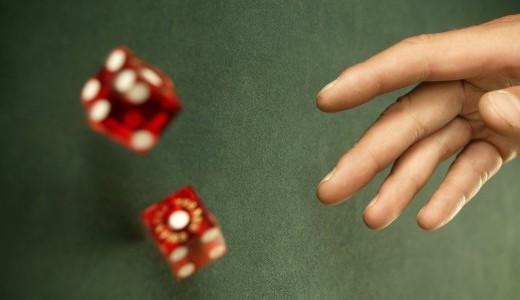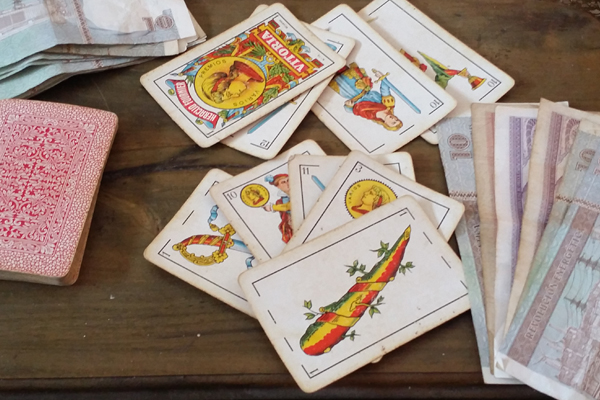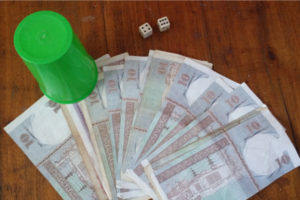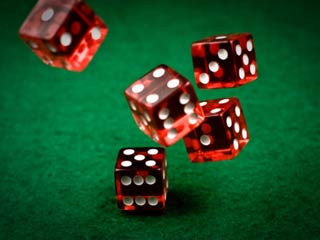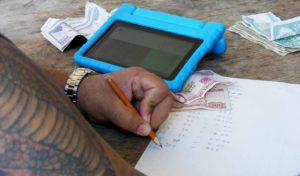“El Rincón del Gallo” is one of the most famous places for illegal games bets on the communist island. The bets with dice can not be absent.
CUBA- In the most intricate of the Havana-Matanzas heights, is one of the most popular illegal casinos in Cuba. A long road difficult to access through the mountain and the hills keep it out of the eyes of the authorities, because in the communist island this type of games is prohibited for decades.
“The big casinos in the world are located in big cities, in luxurious hotels or residential areas. Here it must be like this, very intricate, in the mountains, and it is difficult and hard to get to (…) This is the closest thing to a casino you will find in Cuba and here the bets are big, “explains one of the owners of “El Rincón del Gallo”, a secluded place created for bets of all kinds and games of illegal tables.
Chacho, one of his owners who was called for security reasons, added that “the game here is prohibited since 1959 and we all know what would happen to us if the police took us, but this place offers security, we have several workers at most. high on the hill to watch for any strange movement and nothing has ever happened. ”
“As soon as we arrive at ‘El Rincón del Gallo’, we can breathe an air of freedom, out of all the rules that the revolution has imposed on us. The games of table, cards and dice for money, and the bets of everything, type make this special place (…) Here we feel as if we were in another country, outside of everything that they have imposed on us for more than half a century “, commented Lázaro Salvador, a Literature professor who also said: “I like games and bets and I have never been in agreement with the measure to end that”.
“Here you can play everything for money. Among the favorite games are the lottery, bingo, baccarat, longana (a variant of dominoes that is practiced with six chips). The ‘silot’ with dice, the goblet; the trio, which is a Creole variant of American poker and is played with three cards tacked on the table and the same number in the hand. There are three discards and before you ask for new decks, bets are made “, describes
“Some of these games, such as the silot, have been imported from Cuban prisons, and others like the goblet are more traditional and known. But all of us report profits because every table owner must pay us a tax of 30% of their earnings for being in our facilities. The entrance to the place also has a value of two dollars per person, “says Chacho.
A new form of betting is being implemented in these places. Sports such as European football or the National Baseball Series are in the sights of Chacho, who intends to incorporate this type of bets into his “casino”. “People on the streets do it. Betting on both a football game between Real Madrid and Barcelona and the National Baseball Series. The only limitation we have so far is to bring electricity here. But we are thinking of doing it with a power plant, “he continues.
About the dangers of this sport, for Chacho “everything has its risks and we know that. That’s how we earn our living until we see what will happen in this country in the coming years. ”
Another of the most popular board games of the place is called “the number coins”. The dealer distributes some coins that have a recorded number (from 1 to 30) and the players bet on who has the highest number. The waiter gets 20% of the winnings on each bet.
Here the gastronomic offerings are varied and always at higher prices than normal. “The risk has to be paid”, that was the response of most of the food and beverage vendors that were on the site. They will also have to pay a tax to the owners for selling their products in the place.
Fidel Castro arrived in Havana on January 8, 1959, and one of the first laws decreed by the Revolution was to abolish the game. Slot machines and roulettes were smashed with axes and baseball bats. Today, 57 years later, the game – now clandestine – continues to be part of the lives of Cubans who, even at the risk of going to prison, continue to go to places like “el rincón del gallo”.
UNA VISITA A LOS CASINOS CLANDESTINOS E ILEGALES DE CUBA.
“El rincón del gallo” es uno de los lugares más famosos para las apuestas en la isla comunista. Las apuestas por juegos con dados no pueden faltar.
CUBA- En lo más intrincado de las alturas Habana-Matanzas, se encuentra uno de los casinos ilegales más populares de Cuba. Un largo camino de difícil acceso a través del monte y las lomas lo mantienen fuera de los ojos de las autoridades, pues en la isla comunista este tipo de juegos está prohibido hace décadas.
“Los grandes casinos en el mundo se encuentran ubicados en las grandes ciudades, en lujosos hoteles o zonas residenciales. Aquí debe ser así, bien intrincado, en las montañas, y que sea difícil y trabajoso llegar (…) Esto es lo más parecido a un casino que encontrarás en Cuba y aquí las apuestas son a lo grande”, explica uno de los dueños de “El rincón del gallo”, un apartado lugar creado para las apuestas de todo tipo y los juegos de mesas ilegales.
Chacho, uno de sus dueños que así se hizo llamar por cuestiones de seguridad añadió que “el juego aquí es prohibido desde 1959 y todos sabemos lo que nos pasaría si nos coge la policía, pero este lugar ofrece seguridad, tenemos varios trabajadores en lo más alto de la loma para vigilar cualquier movimiento extraño y hasta ahora nunca ha pasado nada”.
“Apenas llegar a ‘El rincón del gallo’ se puede respirar un aire de libertad, fuera de todas las normas que nos ha impuesto la revolución. Los juegos de mesa, cartas y dados por dinero, y las apuestas de todo, tipo hacen este lugar especial (…) Aquí nos sentimos como si estuviéramos en otro país, fuera de todo lo que nos han impuesto por más de medio siglo”, comentó Lázaro Salvador, un profesor de Literatura que también afirmó: “Me gustan los juegos y las apuestas y nunca he estado de acuerdo con la medida de acabar con eso”.
“Aquí se puede jugar de todo por dinero. Entre los juegos preferidos se encuentran la lotería, el bingo, el bacarat, la longana (una variante del dominó que se practica con seis fichas). El ‘silot’ con dados, el cubilete; el trío, que es una variante criolla del póker norteamericano y se juega con tres cartas viradas bocarriba en la mesa e igual número en la mano. Hay tres descartes y antes de que usted pida nuevas barajas, se hacen apuestas”, describe
“Algunos de estos juegos, como el silot, han sido importados desde las cárceles cubanas, y otros como el cubilete son más tradicionales y conocidos. Pero todos nos reportan ganancias porque cada dueño de mesa debe pagarnos un impuesto del 30% de sus ganancias por estar en nuestras instalaciones. La entrada al lugar también tiene un valor de dos dólares por persona”, cuenta Chacho.
Una nueva modalidad de apuestas se está implementando en estos lugares. Los deportes como el fútbol europeo o la Serie Nacional de Béisbol se encuentran en la mira de Chacho, quien pretende incorporar este tipo de apuestas a su “casino”. “La gente en las calles lo hacen. Se apuesta tanto en un juego fútbol entre el Real Madrid y el Barcelona como en la Serie Nacional de Béisbol. La única limitación que tenemos hasta el momento es traer la electricidad hasta aquí. Pero estamos pensando en hacerlo con una planta eléctrica”, continúa.
Sobre los peligros de este deporte, para Chacho “todo tiene sus riesgos y eso lo sabemos. Así nos ganamos la vida hasta ver qué pasará en este país en los próximos años”.
Otro de los juegos de mesa más populares del lugar es llamado “las monedas de números”. El dealer reparte unas monedas que tienen un número grabado (del 1 al 30) y los jugadores apuestan a quien tiene el mayor número. El mesero obtiene un 20% de las ganancias en cada apuesta.
Aquí las ofertas gastronómicas son variadas y siempre a precios superiores de lo normal. “El riesgo hay que pagarlo”, esa fue la respuesta de la mayoría de los vendedores de alimentos y bebidas que se encontraban en el sitio. Ellos también deberán pagar un impuesto a los dueños por vender sus productos en el lugar.
Fidel Castro arribó a La Habana el 8 de enero de 1959, y una de las primeras leyes decretadas por la Revolución fue abolir el juego. Se destrozaron máquinas tragaperras y ruletas con hachas y bates de béisbol. Hoy, 57 años después, el juego —ahora clandestino— sigue siendo parte de la vida de los cubanos que, incluso bajo el riesgo de ir a prisión, siguen acudiendo a lugares como “el rincón del gallo”.
Agencies/ Cubanet/Orlando González/Internet Photos/ Arnoldo Varona/ TheCubanHistory.com
THE CUBAN HISTORY, HOLLYWOOD.



